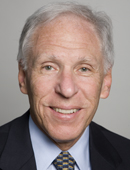
Stuart A Aaronson, MD
About Me
Stuart Aaronson, MD, is the Jack and Jane B. Aron Professor of Neoplastic Diseases; Founding Chair, Emeritus, Department of Oncological Sciences; and Associate Director of Basic and Translational Research at The Tisch Cancer Institute. Dr. Aaronson joined Mount Sinai in 1994 following a long tenure at the National Cancer Institute, during which he was Chief of the Laboratory of Cellular and Molecular Biology.
Dr. Aaronson participated in the discovery of the first normal function of an oncogene and the demonstration that genes encoding growth factors could be transforming (sis/PDGF). He subsequently discovered erbB2 as an erbB-related gene amplified in a primary human breast cancer, and genes for other growth factor signaling molecules activated as oncogenes in human malignancies. Dr. Aaronson’s research has contributed to the development of novel cancer drugs including Herceptin which targets ERBB2, and KGF/FGF7, discovered by him as a unique epithelial cell acting growth factor and which became a drug for treatment of mucositis, a debilitating side effect of certain cancer therapies. His discoveries, including erbB3, PDGFR alpha, and HGF as the ligand for MET, have led to other approved drugs as well as those currently in clinical development as cancer therapeutics. More recently, Dr. Aaronson identified a Wnt autocrine activation mechanism, which helps to drive the malignant phenotype of some human breast, ovary, lung, and soft tissue tumors.
Dr. Aaronson is the recipient of numerous awards including the Distinguished Service Medal from the U.S. Public Health Service, the AACR Award for Outstanding Achievement in Cancer Research, and the Paul Erhlich Prize from Germany. He is the author of more than 485 publications, an inventor on more than 40 patents, and serves on numerous editorial boards and scientific advisory committees. He has trained dozens of investigators, who have gone on to positions in academic medicine or biotech/pharma, or who head cancer centers in this country and abroad.
Language
English
Position
PROFESSOR | Oncological Sciences, PROFESSOR | Medicine
Research Topics
Aging, Cancer, Growth Factors and Receptors, Oncogenes, Signal Transduction
Multi-Disciplinary Training Areas
Cancer Biology [CAB], Disease Mechanisms and Therapeutics (DMT)
Education
BS, University of California, Berkeley
Chief of Lab, National Cancer Institute
Internship, Moffitt Hospital
MD, University of California, San Francisco School of Medicine
Postdoctoral Fellow, National Cancer Institute
Awards
2010
Italian National Academy of Sciences, Foreign Member
Accademia Nazionale Dei Lincei
2006
National FLC Award for Excellence in Technology Transfer
Kepivance: Improving the Quality of Life for Cancer Patients
1991
Chirone Prize
1990
Milken Award
1989
PHS Distinguished Service Medal
1989
Paul Ehrlich and Ludwig Darmstaedter Prize
1982
PHS Meritorious Service Medal
1982
AACR - Outstanding Achievement in Cancer Research Award
American Association for Cancer Research
1966
Alpha Omega Alpha
1962
Phi BetaKappa
Research
The Aaronson laboratory is involved in cancer gene discovery and function with the goal of identifying novel targets for therapy. Topics currently under investigation include growth factors and receptors, Wnt and Hippo developmental pathways deregulated in cancer as well as the p53 tumor suppressor gene. Past discoveries include ErbB2, initially identified by his lab as an amplified erbB related gene in a primary human breast cancer. The lab has also discovered and characterized genes for a number of other growth factor signaling molecules activated as oncogenes in human malignancies. This research has contributed to novel cancer drugs including Herceptin, which targets ERBB2, and KGF/FGF7, which became Kepivance, for treatment of cancer therapy associated mucositis. Other discoveries including erbB3, PDGFR alpha, and HGF as the ligand for MET, have also led to agents currently in clinical development as cancer therapeutics. More recent accomplishments include identification of a Wnt autocrine mechanism that contributes to the transformed phenotypes of several major human tumors and novel homeostatic stress responses involving the p53 tumor suppressor gene.
Publications
Selected Publications
- RAS Mutation–Specific Responses to Paralog-and State-Selective RAS Inhibitors. Beau Baars, Ana Orive-Ramos, Matthew J. Emmett, Bijaya Gaire, Mathieu Desaunay, Ziyue Kou, Guangyan Li, Christos Adamopoulos, Stuart A. Aaronson, Shaomeng Wang, William R. Sellers, Tiphaine Martin, Evripidis Gavathiotis, Poulikos I. Poulikakos. Molecular Cancer Research
- Prolonging lung cancer response to EGFR inhibition by targeting the selective advantage of resistant cells. Lisa Brunet, David Alexandre, Jiyoung Lee, Maria del Mar Blanquer-Rosselló, David Bracquemond, Alexis Guernet, Houssein Chhouri, Mathilde Goupil, Zoulika Kherrouche, Arnaud Arabo, Maicol Mancini, Dorthe Cartier, Shen Yao, David Godefroy, Julie Dehedin, Jian Rong Li, Céline Duparc, Philippe Jamme, Audrey Vinchent, Caroline Bérard, David Tulasne, Sabrina Arena, Alberto Bardelli, Chao Cheng, Byoung Chul Cho, Olivier Wurtz, Cédric Coulouarn, Antonio Maraver, Stuart A. Aaronson, Alexis B. Cortot, Youssef Anouar, Luca Grumolato. Nature Communications
- Retraction Note: ROCK1 mechano-signaling dependency of human malignancies driven by TEAD/YAP activation (Nature Communications, (2022), 13, 1, (703), 10.1038/s41467-022-28319-3). Davide Esposito, Ila Pant, Yao Shen, Rui F. Qiao, Xiaobao Yang, Yiyang Bai, Jian Jin, Poulikos I. Poulikakos, Stuart A. Aaronson. Nature Communications